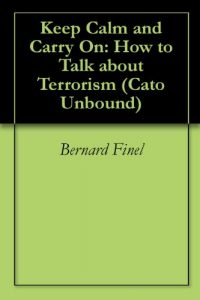Research on risk response shows that most of us are very bad at knowing what to make of highly improbable but possibly disastrous future events. Risk perception is far from uniform: Some types of risk we tend to grossly underestimate, while others, we overestimate. These biases have been the subject of a great deal of scrutiny following the events of September 11, 2001 and subsequent terrorist attacks around the world. They are also one subject being discussed at the January, 2009 Cato Institute conference "Shaping the Obama Administration's Counterterrorism Strategy."
In conjunction with this conference, the editors of Cato Unbound are pleased to bring you a very special edition of the journal, one focused on how to talk about terrorism, how to evaluate risks, and how craft sensible public policy even under the intense pressure of an emergency situation.
Social psychology researchers have consistently found, for example, that threats of terrorism loom far larger in the public mind than natural disasters, although natural disasters have so far proven vastly more destructive. Well-crafted public policy will recognize, and hopefully avoid, tendencies toward overreaction to the threat of terrorism, particularly considering the threat that a panicked reaction itself can pose to our civil liberties and our way of life.
It was not the size of the risk itself, but rather the disparity between the likelihood of risk and the concern given to it, that prompted social psychologist Paul Slovic to dub terrorism a "new species of trouble": The trouble lies in how terrorism makes people respond, as well as in the actual harm caused by terrorist acts. This month at Cato Unbound we have invited four experts on terrorism and counterterrorism for a discussion of the role of risk, fear, and well-crafted communication in fighting terrorism.
Leading this issue is William Burns, a research scientist at Decision Research and consultant at the Center for Risk and Economic Analysis of Terrorism Events (CREATE). Responding to him will be Bernard Finel, a Senior Fellow at the American Security Project; John Mueller, the Woody Hayes Chair of National Security Studies at Ohio State University's Mershon Center; and Camille Pecastaing, director of the Behavioral Sociology Project at the Paul H. Nitze School of Advanced International Studies of the Johns Hopkins University.
In conjunction with this conference, the editors of Cato Unbound are pleased to bring you a very special edition of the journal, one focused on how to talk about terrorism, how to evaluate risks, and how craft sensible public policy even under the intense pressure of an emergency situation.
Social psychology researchers have consistently found, for example, that threats of terrorism loom far larger in the public mind than natural disasters, although natural disasters have so far proven vastly more destructive. Well-crafted public policy will recognize, and hopefully avoid, tendencies toward overreaction to the threat of terrorism, particularly considering the threat that a panicked reaction itself can pose to our civil liberties and our way of life.
It was not the size of the risk itself, but rather the disparity between the likelihood of risk and the concern given to it, that prompted social psychologist Paul Slovic to dub terrorism a "new species of trouble": The trouble lies in how terrorism makes people respond, as well as in the actual harm caused by terrorist acts. This month at Cato Unbound we have invited four experts on terrorism and counterterrorism for a discussion of the role of risk, fear, and well-crafted communication in fighting terrorism.
Leading this issue is William Burns, a research scientist at Decision Research and consultant at the Center for Risk and Economic Analysis of Terrorism Events (CREATE). Responding to him will be Bernard Finel, a Senior Fellow at the American Security Project; John Mueller, the Woody Hayes Chair of National Security Studies at Ohio State University's Mershon Center; and Camille Pecastaing, director of the Behavioral Sociology Project at the Paul H. Nitze School of Advanced International Studies of the Johns Hopkins University.












